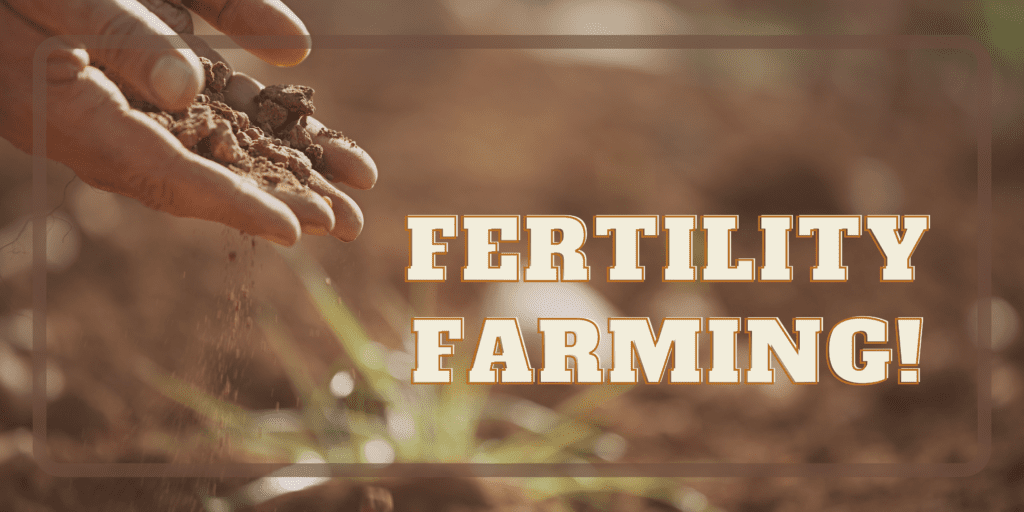Fertility Farming Method
The fertility farming method is a farming practice promoted by Newman Turner in 1951, which included the use of a cover crop, no-tillage, no chemical fertilisers, no pesticides, no weeding, and no composting. Turner’s “fertility farming” concepts are comparable to Fukuoka’s natural farming approach, despite Turner being a commercial farmer who did not practise random sowing of seed balls. It’s about the ability of excellent farming to bring a dying farm back to life, as well as a revelation for innovative, reformative cultivation built on biological ideologies, careful reflection, reverence for the soil, and sustained effort. Newman Turner didn’t let the lack of technology at the time deter him from innovating and caring for his property. He didn’t wait for the invention of no-till drills to minimise tillage. Instead, he reused disc harrows to seed unploughed ground. He didn’t wait for polywire to be created to implement long-season intense rotational grazing. Instead, he moved the fence in a zig-zag manner up a field every day using solid steel wire.
Turner put a layer of chalk over the surface to keep air out rather than waiting for plastic films to be created to ensile forages at their peak nutrition in inexpensive trench silos. In place of military duty, Turner, a meticulous complainer, was allotted to operate a failing dairy and grain farmhouse in Somerset, England, in 1941. He inherited depleted soils, crops ravaged by bugs and ailment, and a flock of thoroughbred Jersey livestock rendered nearly sterile. Turner saw that his farm’s difficulties were basically signs of damaged soil, declining his day’s reductionist “technical” inclination to regard each of these complications as independent and in need of their peculiar chemical remedies. He set out to create a technique to form an economically and environmentally sustainable farm, knowing that plants, cattle, and human well-being are all dependent on soil healthiness. Fertility farming method is the term used to describe this technique. Turner saw economic, ecological, and agronomic endurance as all being synonymous with one another.
Regenerative agriculture is a new word that has recently gained popularity. Compact tilth (non-disturbance), an assortment of flora and fauna, keeping the soil shielded, retaining alive roots in the ground, and integrating cattle into agricultural systems are among its basic concepts. Over seventy years ago, Turner recognised and practised each of these ideas on his farm. Together with deeply penetrating roots, earthworms and soil microorganisms are used by nature to perform its job, rather than ploughing it out by hand. Turner argues that soil biology is more essential than soil chemistry in terms of plant nutritional requirements. The fertility farming method includes the use of weeds as active accumulators, the significance of trees for ecology services, and many other practices. Livestock is important because of its contribution to the cycling of nutrients in an agroecosystem. The demonstration of livestock ploughs requires no fuel, and manure is disseminated across the soil surface in the course of this powerless ploughing.
Nature created healthy, living soils in the past, and there is benefit in replicating this process in order to restore soil health. However, we cannot afford to wait millions of years for nature to do so; we require deliberate intervention. Farming, composting, fossil humates, soil preservation, visual soil evaluation, eco-friendly manuring, grazing, soil screening, fertiliser prioritisation, and ground remineralisation all contribute to the development of self-reliant, self-regenerative productive soils. One of the most significant soil properties for crop development is soil fecundity. According to soil fertility and sustainable farming experts, most soils have the need for their vigour and fecundity renewed. The organic, regenerative fertility farming method is unquestionably the paradigm we require for the love and attention of enormous tracts of land that have been neglected and in ruins for far too long. Fertile soils hold reasonably high nutrients required for plant development and excellent output. As organic farming is a pressing necessity, the Uyir organic farmers market is attempting to raise awareness of the benefits of organic farming and its products among the general public.



